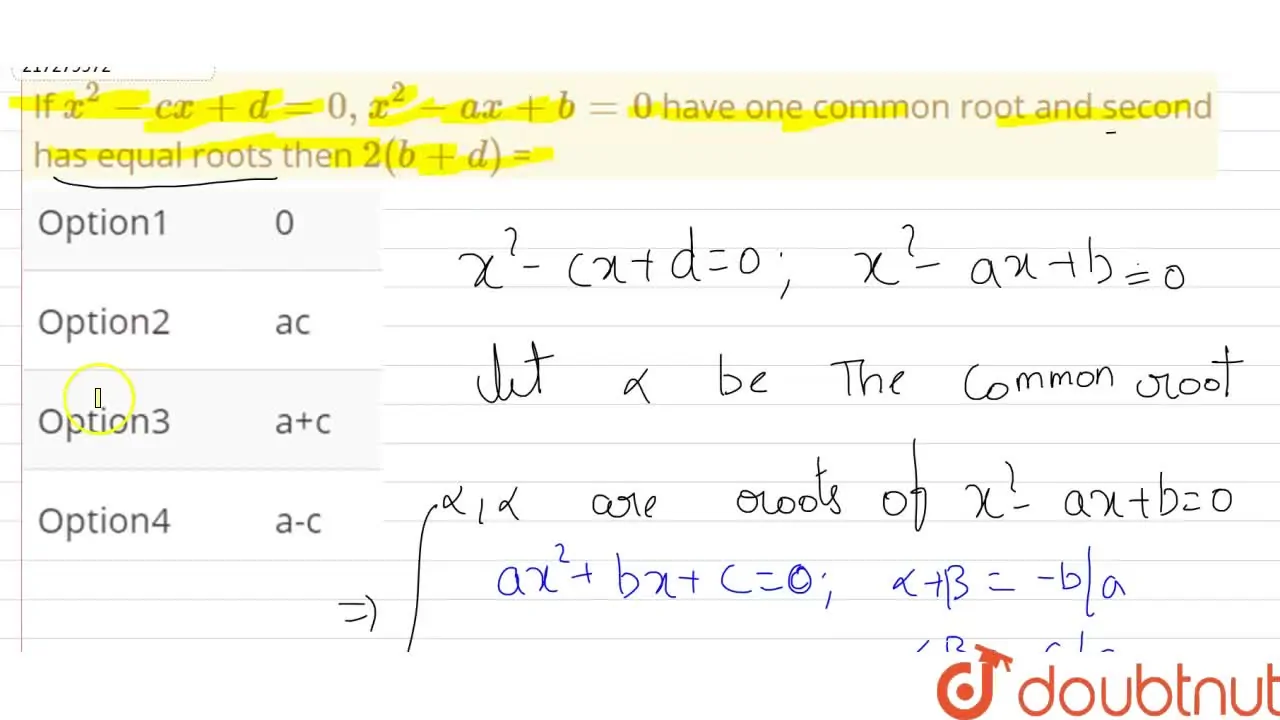If x2−cx+d=0,x2−ax+b=0 have one common root and second has equal roots then 2(b+d) =Solution in Telugu
a+c
a-c
ac
a/c
The correct Answer is:C
Step by step video, text & image solution for If x^2 - cx +d =0 , x^2-ax +b=0 have one common root and second has equal roots then 2 (b+d) = by Maths experts to help you in doubts & scoring excellent marks in Class 12 exams.
Related Playlists
- BOOK - AAKASH SERIESCHAPTER - QUADRATIC EQUATIONS & EXPRESSIONSEXERCISE - PRACTICE EXERCISE88videos
QUADRATIC EQUATIONS & EXPRESSIONS
- BOOK - AAKASH SERIESCHAPTER - QUADRATIC EQUATIONS & EXPRESSIONSEXERCISE - EXERCISE-I56videos
QUADRATIC EQUATIONS & EXPRESSIONS
- BOOK - AAKASH SERIESCHAPTER - PROBABILITYEXERCISE - Practise Exercise165videos
PROBABILITY
- BOOK - AAKASH SERIESCHAPTER - RANDOM VARIABLE EXERCISE - PRACTICE EXERCISE34videos
RANDOM VARIABLE
Similar Questions
If 3x+22x+3=4x+33x+4, then x =
03:11View SolutionIF m,n,K are rational and m=k+nk then the roots of x2+mx+n=0 are
01:36View SolutionThe probability that a non leap year will have 53 Wednesdays is
03:21View SolutionA random variable X ahs the following distribution
x1234P(X=x)c2c3c4c
The value of c is03:06View SolutionIfc^(2)=4d and the two equations x^(2)-ax+b=0 and x^(2)-cx+d=0 have a common root,then the value of 2(b+d) is equal to 0 ,have one
02:41View SolutionIf the two equations x^(2)-cx+d=0 and x^(2)-ax+b=0 have one common root and the second has equal roots,then 2(b+d)=(A)0(B)a+c(C)ac(D)-ac
04:07View SolutionIf the equations x^(2)-px+q=0 and x^(2)-ax+b=0 have a common root and the second equation has equal roots then
01:25View SolutionIf the equation x2+ax+b=0andx2+cx+d=0 have a common root and the first equation has equal roots, then prove that 2(b+d)=ac.
02:56View SolutionIf x2−cx+d=0,x2−ax+b=0 have one common root and second has equal roots then 2(b+d) =
03:58View SolutionIF x2+bx+a=0,ax2+x+b=0 have a common root and the first equation has equal roots then 2a2+b=
04:22View SolutionIf the equation x2−cx+d=0 has roots equal to the fourth powers of the roots of x2+ax+b=0, where a2>4b, then the roots of x2−4bx+2b2−c=0 will be
02:38View SolutionIf the two equation x2−cx+d=0 and x2−ax+b=0 have one common root and the second has equal roots then 2(b + d) is equal to
01:13View Solutionयदि दो समीकरणों x2−cx+d=0 व् x2+ax+b=0 का एक उभयनिष्ट मूल हो तथा दूसरा समीकरण समान रखता है, तब 2(b+d) का मान है
View SolutionIf the equations x2−ax+b=0andx2−ex+f=0 have one root in common and if the second equation has equal roots then prove that ae=2(b+f).
05:02View SolutionIf a,b,c,d∈R−{0} , such that a,b are the roots of equation x2+cx+d=0 and c,d are the roots of equation x2+ax+b=0, then |a|+|b|+|c|+|d| is equal to
03:45View Solutionयदि दो समीकरणों x2−cx+d=0 तथा x2−ax+b=0 का एक उभयनिष्ठ मूल हो तथा दूसरा समीकरण समान मूल रखता है, तब 2(b+d)=
02:29View Solution


